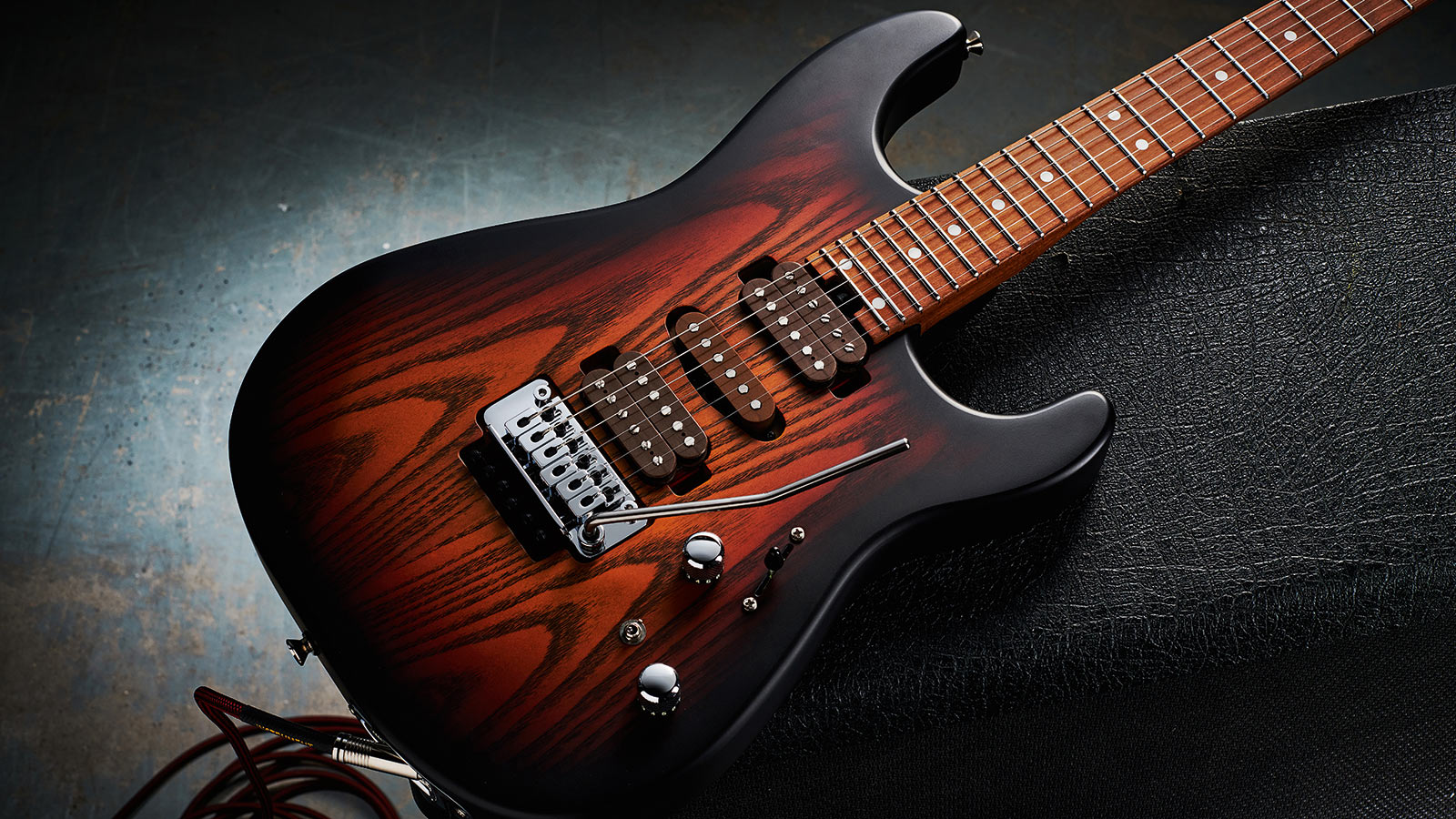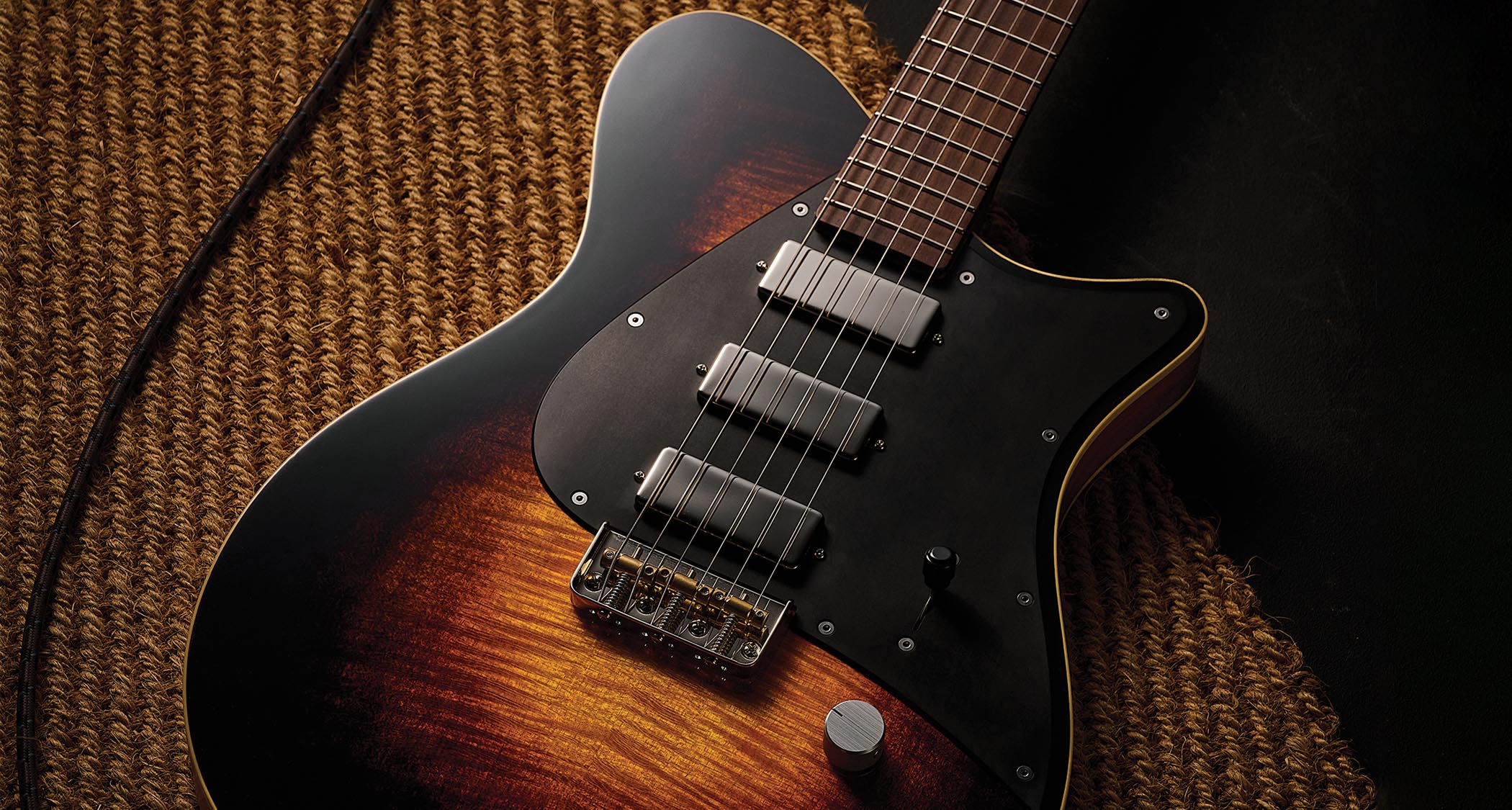Guitar World Verdict
For the performing musician or studying musician who doesn’t want to limit the sounds they can produce from one guitar, it’s hard to fault.
Pros
- +
Very fit-for-purpose working guitar.
- +
Faultless build.
- +
Very stable in terms of tuning.
- +
Widely diverse sounds.
- +
Fully hum-cancelling.
Cons
- -
As good as it is, the GG faces some stiff competition.
- -
Some different colors might broaden the appeal.
You can trust Guitar World
Charvel has been owned by Fender Musical Instruments Corporation since 2002 and it’s been a good fit, sitting between the more-rock aimed Jackson line and the modern fringes of Fender, such as the Ultra range.
In fact, if you simply consider Charvel to be the ‘modern’ Fender, you’re just about there. Another way to view the brand, particularly this latest Guthrie Govan signature guitar, is a souped-up and pimped version of what once may have been a Stratocaster.
Whichever way you view it, the GG is built for pro-level use and, as Guthrie himself tells us, despite having another pair of US signatures, this more affordable Japanese-made model is actually his No 1 currently. If it’s good enough for Guthrie...
The guitar centres around a standard Fender scale length, but it has a 24-fret neck that sits on a lightly chamfered heel with a palm scoop on the back underneath the treble cutaway.
The nut is standard style, not locking, yet the return to pitch is superb
As with numerous Charvels instruments, including the US GG signatures, the neck is caramelized (aka roasted) maple, rift-sawn, with dual carbon graphite rods either side of the two-way truss rod with its spoke wheel adjuster at the base of the neck. Frets are stainless steel and they’re big.
There are numerous subtle changes compared with the existing USA models, too: the nut, for example, is Tusq XL (not bone), the locking tuners are by Gotoh, not Sperzel, but still retain staggered height posts, and the fingerboard inlays are simple ‘crème’ dots.
As ever, the side dots are those glow-in-the-dark Luminlay types; the same fluorescent material is used around the base of the control knobs to highlight the numbers.
All the latest guitar news, interviews, lessons, reviews, deals and more, direct to your inbox!

The major change here, however, is not only the sunburst finish to the face but also that the body material is basswood topped with what Charvel calls an ash ‘top’.
On removing the neck, though, you can see in the cleanly-cut pocket that it’s just a thin veneer – a visual effect, let’s say – and the top face is also perfectly flat, unlike the current trend for more open-pore style finishes, especially those over ash.
The edges are less radiused than you’d find on a vintage Stratocaster, the forearm and rib-cage contour less dished. But with a weight of 3.65kg (8.03lb) it feels perfect – purposeful, and certainly not feather-light.
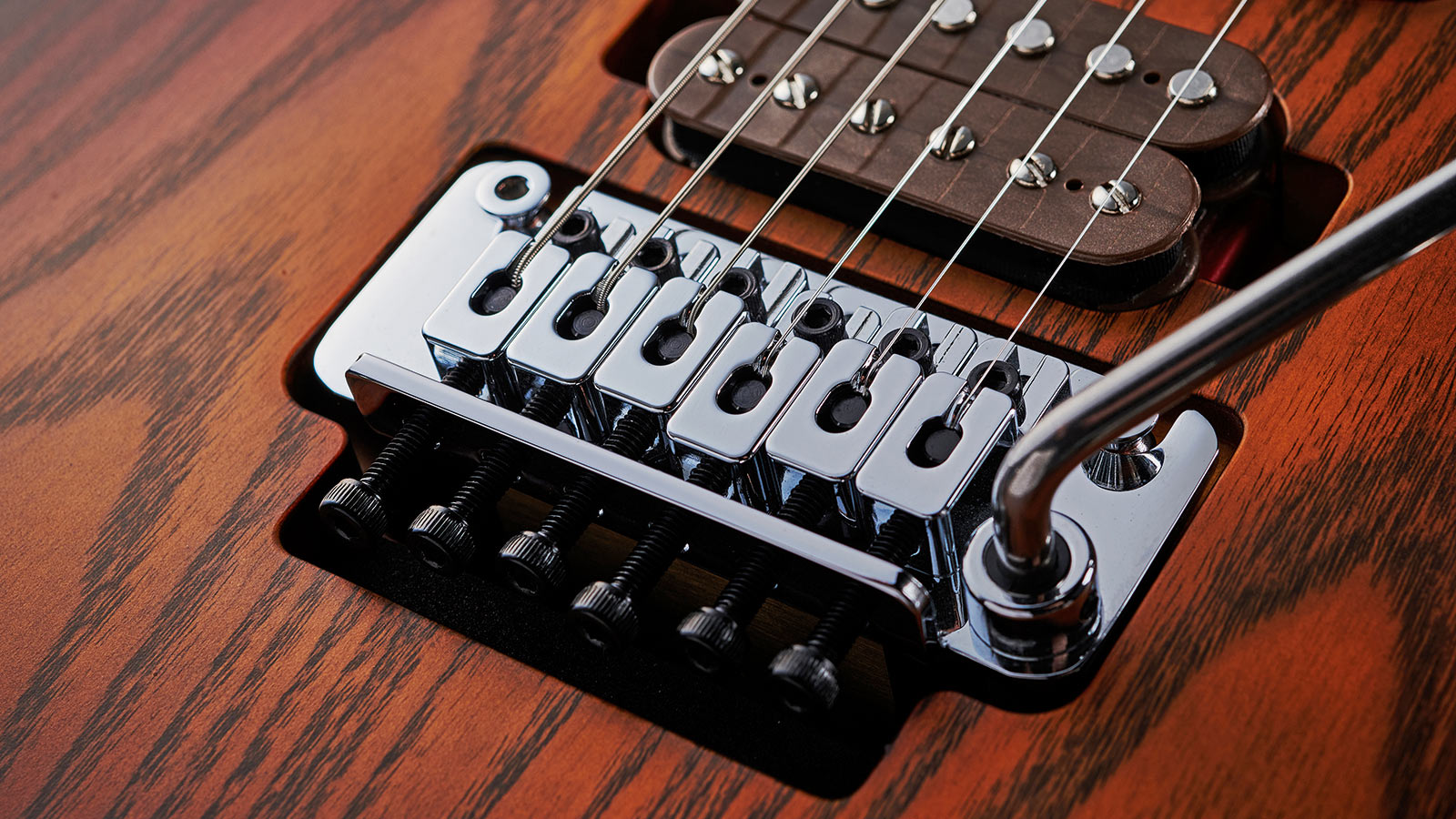
Called a Charvel ‘locking tremolo bridge’, which we’d call a Floyd Rose without the fine tuners, the all-steel vibrato with its brass block is recessed into the body so the face of the baseplate is level with the face of the body. It’s back-routed, too, although it gives a wide range from just about five semitones up on the G string down to pretty much slack.
As we mentioned, the nut is standard style, not locking, yet the return to pitch is superb, particularly with that range. Irrespective of its vibrato, it’s a very stable guitar, tuning-wise.
Overall, straight out of the box, the playability is superb and, as we said, tuning-wise it’s very stable
The pickups and circuit are, according to Guthrie, the same as his other signatures, but these pickups are Korean-made to the same specs as the USA pickups, and the bridge humbucker, while still direct-mounted, has some foam underneath to allow limited height adjustment.
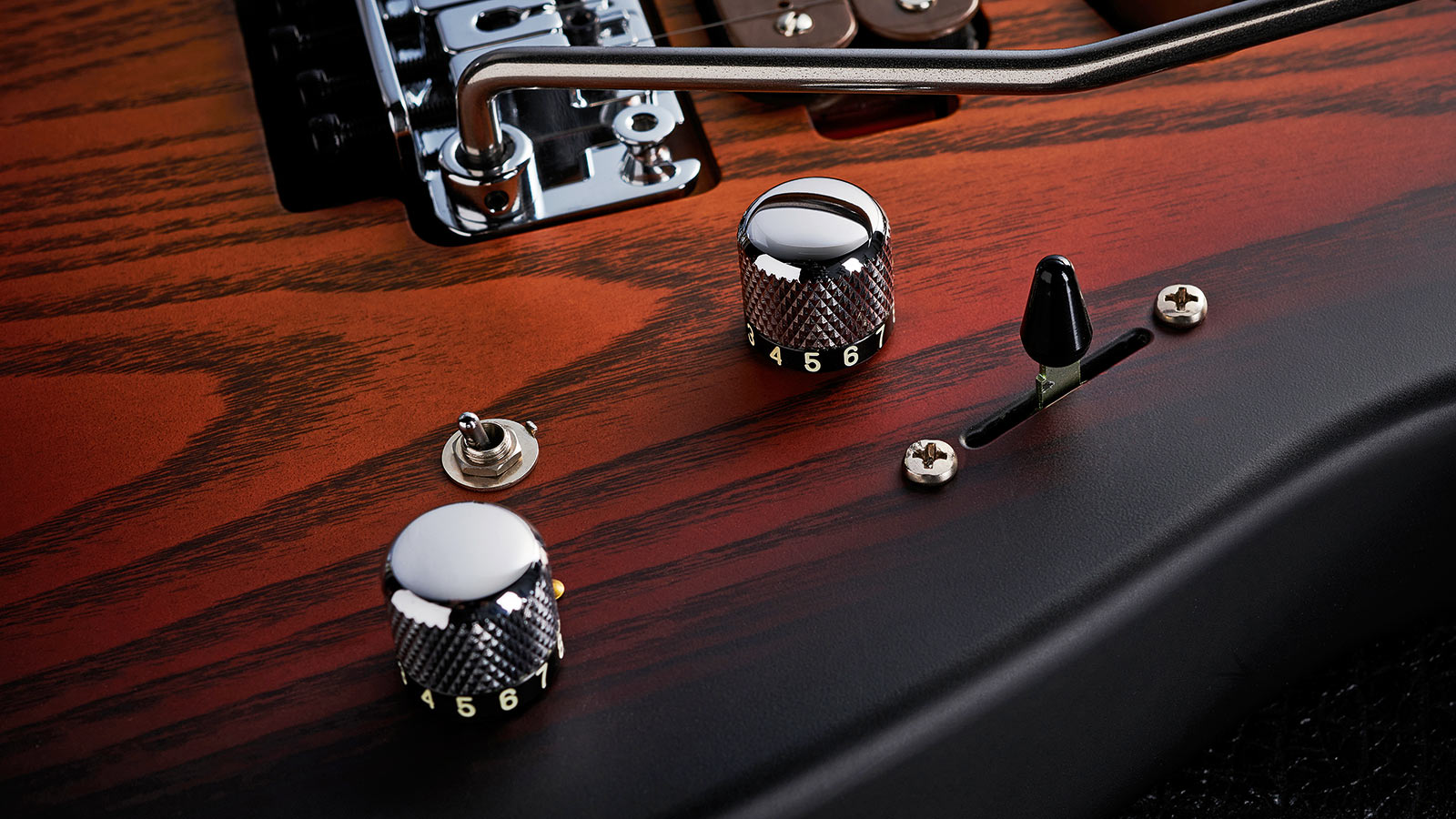
The circuit is simple in action: master volume and master tone with a five-way level switch that offers bridge humbucker in position 1; bridge inner single coil and middle single coil in position 2; bridge outer single coil and neck outer single coil in position 3; middle single coil and neck outer single coil in position 4; and, finally, the neck humbucker in position 5.
A small-tipped mini-toggle switch provides a simulated single-coil voice for either solo humbucker, too, and, by design, all selections are hum-cancelling.
As with the previous signatures, the output jack plate is in the dished style of the Stratocaster, but it’s placed on the treble side of the bottom strap button so you can easily thread your lead through your strap for some extra onstage security.
Feel & Sounds
Despite those extra frets the GG obviously feels very familiar, both strapped on and seated. The neck is classed as having a ‘speed’ profile, which equates to its pretty flat 305mm to 406mm (12- to 16-inch) compound radius and what feels like a shallow C profile.
It’s very modern Charvel in style with similar depth (20mm at the 1st fret and 21.2mm at the 12th) to other models we’ve previously reviewed. Those frets are big (approximately 2.77mm wide by 1.45mm high) with plenty of height, but the work is very good and that includes quite heavily rolled edges. In terms of setup, things are set pretty low, too (approximately 1.3mm on both treble and bass sides at the 12th fret), with minimal relief.
There are some seriously big sounds here contrasted by quite shimmery single-coil voices
Overall, straight out of the box, the playability is superb and, as we said, tuning-wise it’s very stable. Once again we rarely touched the tuners during our sound test, which went on for a considerable time.
As we found when we looked at the previous GG signature, the sounds we hear and explore here are very diverse, and yet outside of the solo humbuckers every other sound is a combination of single coils: there’s a little honk to the funk in positions 2 and 4, while in position 3 we welcome a Telecaster-style mix.
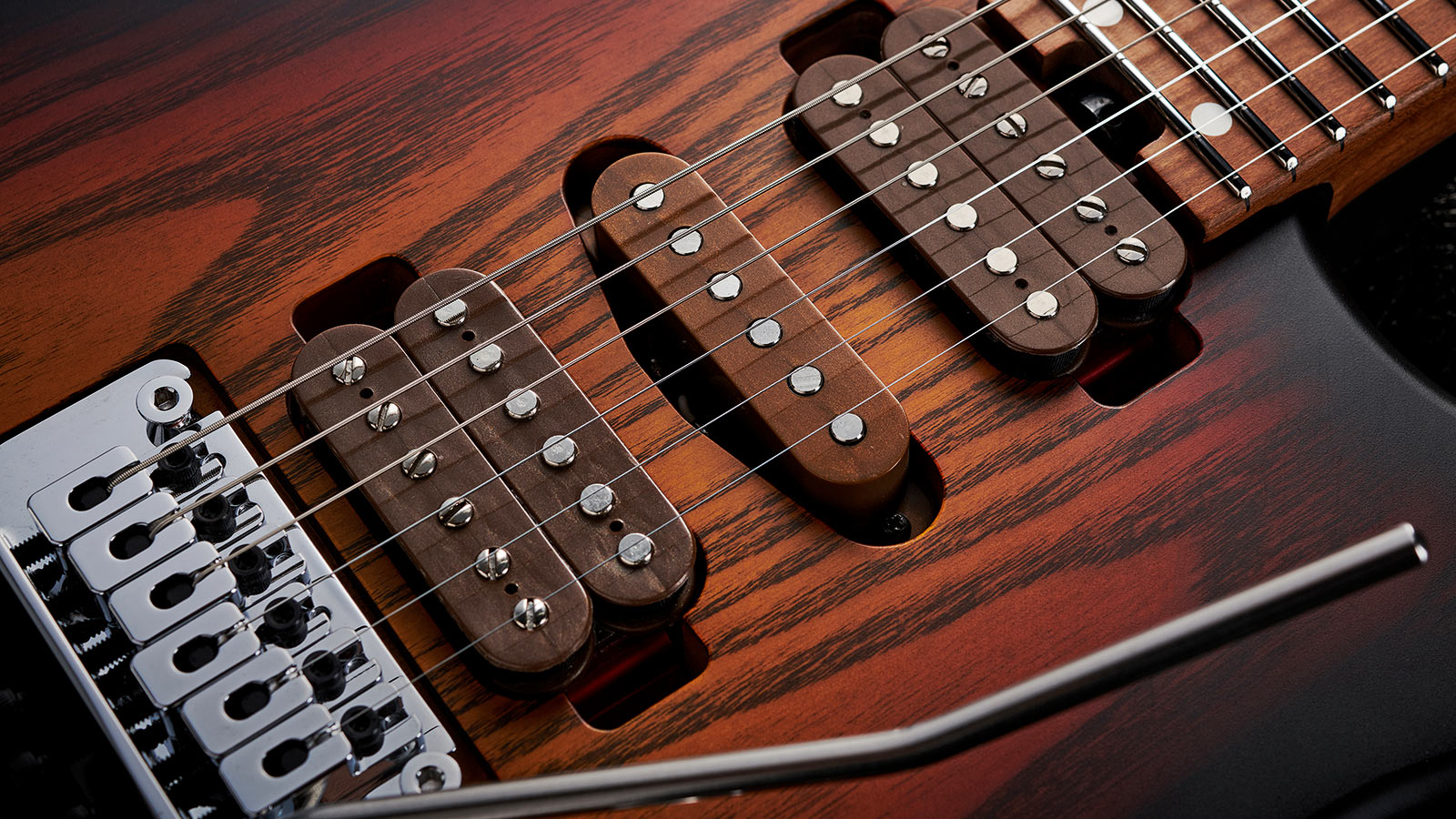
The solo pickup single-coil simulations are seamless and really balanced with those mixes, with less volume drop than you might experience when faced with a standard coil-split. But if you want an altogether different voice then the full-coil humbuckers are there to provide it: the bridge has a snarly, punchy midrange clout, and the neck is thick but well balanced, a gear or two above hot vintage.
But the tricks don’t stop there because with such a well-voiced treble bleed circuit on the volume control, pulling it back tames some of the bluster without dulling the attack. Certainly, if you drive this guitar with those controls full-up then it’s cool, but you’re missing a lot – especially when you’re working with your pedalboard.
Verdict
It’s all right for big league guitar players to take out 10 or more guitars – they have roadies and techs to lug them around, restring and maintain them.
Yet here is the antithesis of that: a perfectly aimed working tool that covers vast amounts of ground and could just as easily be used for your jazz sit-in gig as it could be on your arena rock tour. A decent gigbag and some spare strings and you’re good to go, wherever your music takes you.
There are some seriously big sounds here contrasted by quite shimmery single-coil voices, and everything is hum-cancelling by design, so that’s something else you don’t have to worry about. For the performing musician or studying musician who doesn’t want to limit the sounds they can produce from the one guitar, it’s hard to fault.
Specs
- PRICE: $2,799 / £2,449 (inc case)
- ORIGIN: Japan
- TYPE: Offset double-cutaway San Dimas-shaped solidbody electric
- BODY: Basswood with ash veneer facing
- NECK: Caramelized flame maple with graphite reinforcement, bolt-on
- SCALE LENGTH: 648mm (25.5-inch)
- NUT: Graph Tech Tusq XL/43.1mm
- FINGERBOARD: Caramelized flame maple, Crème Dot inlays,305-406mm(12-16”) compound radius, Luminlay side dots
- FRETS: 24, Jumbo stainless steel
- HARDWARE: Recessed Charvel locking vibrato, Gotoh rear-locking tuners
- STRING SPACING, BRIDGE: 50.5mm
- ELECTRICS: Charvel Custom humbuckers (bridge and neck); Custom single coil (middle), 5-position lever pickup selector switch, master volume and tone (w/ knurled dome-style Luminlay numbered knobs), 2-position ‘single coil’ mini- switch (bridge and neck pickups only)
- WEIGHT (kg/lb): 3.65/8.03
- OPTIONS: None
- RANGE OPTIONS: There are 2 USA GG signatures (both £3,699), the USA Signature HSH Caramelized Ash and the USA Signature HSH Flame Maple. Other MJ Charvels are the HSS Rick Graham Signature MJ DK24 2PT CM (£2,549) and the HSH MJ DK24 HSH 2PT E Mahogany with Figured Walnut (£2,299)
- LEFT-HANDERS: No
- FINISHES: Three-Tone Sunburst – satin body and neck, sunburst color to top only, back and body sides are black
- CONTACT: Charvel

Dave Burrluck is one of the world’s most experienced guitar journalists, who started writing back in the '80s for International Musician and Recording World, co-founded The Guitar Magazine and has been the Gear Reviews Editor of Guitarist magazine for the past two decades. Along the way, Dave has been the sole author of The PRS Guitar Book and The Player's Guide to Guitar Maintenance as well as contributing to numerous other books on the electric guitar. Dave is an active gigging and recording musician and still finds time to make, repair and mod guitars, not least for Guitarist’s The Mod Squad.
